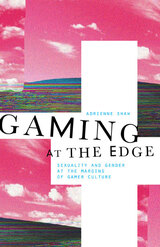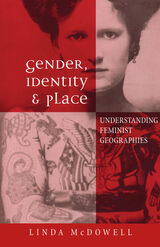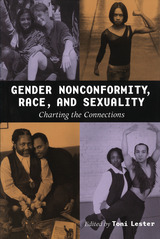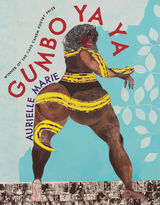9 start with G start with G

Video games have long been seen as the exclusive territory of young, heterosexual white males. In a media landscape dominated by such gamers, players who do not fit this mold, including women, people of color, and LGBT people, are often brutalized in forums and in public channels in online play. Discussion of representation of such groups in games has frequently been limited and cursory. In contrast, Gaming at the Edge builds on feminist, queer, and postcolonial theories of identity and draws on qualitative audience research methods to make sense of how representation comes to matter.
In Gaming at the Edge, Adrienne Shaw argues that video game players experience race, gender, and sexuality concurrently. She asks: How do players identify with characters? How do they separate identification and interactivity? What is the role of fantasy in representation? What is the importance of understanding market logic? In addressing these questions Shaw reveals how representation comes to matter to participants and offers a perceptive consideration of the high stakes in politics of representation debates.
Putting forth a framework for talking about representation, difference, and diversity in an era in which user-generated content, individualized media consumption, and the blurring of producer/consumer roles has lessened the utility of traditional models of media representation analysis, Shaw finds new insight on the edge of media consumption with the invisible, marginalized gamers who are surprising in both their numbers and their influence in mainstream gamer culture.


Gender in Pre-Hispanic America offers rich opportunities for comprehending current trends and considering future directions in research. It is unique in that it puts social theory at the forefront of the discussion. The book has a special intellectual presence and contemporary relevance in its engagement with the social lives and constructs of its authors and readers alike. The consideration of the role of gender in our daily lives, including in our professions, becomes inescapable when reading this book. It is not simply a question of men's roles having been possibly overemphasized and overstudied to the detriment of women's. The fact that genders, as opposed to sexes, are socially constructed categories focuses our attention on the ways in which these and other social constructs have shaped our present understanding of the past and informed past peoples' understand of their present.
In various articles in this book, the reader will not find unanimity in what is meant by "gender" or how to go about studying it. What will be found, however, is a collection of interesting, informed, thought-provoking, and often lively essays. It is hoped that this volume will mark a stage in an evolving study of this field and provoke new research in the future.

How are culturally constructed stereotypes about appropriate sex-based behavior formed? If a person who is biologically female behaves in a stereotypically masculine manner, what are the social, political, and cultural forces that may police her behavior? And how will she manage her gendered image in response to that policing? Finally, how do race, ethnicity, or sexuality inform the way that sex-based roles are constructed, policed, or managed?
The chapters in this book address such questions from social science perspectives and then examine personal stories of reinvention and transformation, including discussions of the lives of dancers Isadora Duncan and Bill T. Jones, playwright Lorraine Hansberry, and surrealist artist Claude Cahun.Writers from fields as diverse as history, art, psychology, law, literature, sociology, and the activist community look at gender nonconformity from conceptual, theoretical, and empirical perspectives. They emphasize that gender nonconformists can be gay, lesbian, bisexual, transgender, or anyone else who does not fit a model of Caucasian heterosexual behavior characterized by binary masculine and feminine roles.


Comparing various European and American historiographies from the past two hundred years, Gendering Historiography provides insights into the establishment and cultivation of gendered power relations in different societies and outlines the devastating effects that exclusionary practices can have on each national canon. This detailed and revealing book will change the face of history writing, bringing overlooked and previously excluded histories back into modern historiography.


In Graphic Migrations, Kavita Daiya provides a literary and cultural archive of refugee stories and experiences to respond to the question “What is created?” after decolonization and the 1947 Partition of India. She explores how stories of Partition migrations shape and influence the political and cultural imagination of secularism and contribute to gendered citizenship for South Asians in India and its diasporas.
Daiya analyzes modern literature, Bollywood films, Margaret Bourke-White’s photography, advertising, and print culture to show how they memorialize or erase refugee experiences. She also uses oral testimonies of Partition refugees from Hong Kong, South Asia, and North America to draw out the tensions of the nation-state, ethnic discrimination, and religious difference. Employing both Critical Refugee Studies and Feminist Postcolonial Studies frameworks, Daiya traces the cultural, affective, and political legacies of Partition migrations.
The precarity generated by modern migration and expressed through public culture prompts a rethinking of how dominant media represents gendered migrants and refugees. Graphic Migrations demands that we redraw the boundaries of how we tell the story of modern world history and the intricately interwoven, intimate production of statelessness and citizenship across the world’s communities.

Gumbo Ya Ya, Aurielle Marie’s stunning debut, is a cauldron of hearty poems exploring race, gender, desire, and violence in the lives of Black gxrls, soaring against the backdrop of a contemporary South. These poems are loud, risky, and unapologetically rooted in the glory of Black gxrlhood. The collection opens with a heartrending indictment of injustice. What follows is a striking reimagination of the world, one where no Black gxrl dies “by the barrel of the law” or “for loving another Black gxrl.” Part familial archival, part map of Black resistance, Gumbo Ya Ya catalogs the wide gamut of Black life at its intersections, with punching cultural commentary and a poetic voice that holds tenderness and sharpness in tandem. It asks us to chew upon both the rich meat and the tough gristle, and in doing so we walk away more whole than we began and thoroughly satisfied.
READERS
Browse our collection.
PUBLISHERS
See BiblioVault's publisher services.
STUDENT SERVICES
Files for college accessibility offices.
UChicago Accessibility Resources
home | accessibility | search | about | contact us
BiblioVault ® 2001 - 2024
The University of Chicago Press









